|
|
| |
| EVENTS |
|
|
> Dialogue on Democracy, Governance and Extremism with the delegation accompanying the Honourable Deputy Prime Minister of Canada
|
| |
|
Dialogue on Democracy, Governance and Extremism with the delegation accompanying the Honourable Deputy Prime Minister of Canada
September 15,2005
PILDAT Islamabad
|
|
| |
Introduction
A 13-member delegation consisting of Members of Parliament, Academicians, Government Officials and intellectuals led by Honourable Anne McLellan, the Deputy Prime Minister of Canada, was in Pakistan on an official visit during the middle of September 2005. In addition to various other engagements, the delegation had desired to meet a select group of Pakistani parliamentarians, academicians and intellectuals to exchange views on topics that are frequently discussed in Canadian society in the context of relations with Pakistan.
Pakistan Institute of Legislative Development and Transparency � PILDAT had organised a dialogue between some members of the visiting delegation and a select group of Pakistani Parliamentarians, analysts and academicians on September 15, 2005 at PILDAT office in Islamabad. The broad theme of the dialogue was �State of Democracy and Governance in Pakistan And Perceptions about Extremism�.
The session commenced with the welcome remarks by the Executive Director of PILDAT, Mr. Ahmed Bilal Mehboob, in which he briefed the participants of the session about the theme of the Dialogue and introduced participants of the Dialogue. Pakistani participants included Prof. Dr. Tahir Amin, Department of International Relations, Quaid-e-Azam University, Islamabad; Senator Nisar A. Memon, Chairman Senate Committee on Defence and Defence Production; Lt. General (Retd.) Asad Durrani, former Director General Inter-Services Intelligence; Ms. Sherry Rehman, MNA and Chairperson, Policy Planning Wing, Pakistan Peoples Party Parliamentarian (PPPP); Mr. Farhan Bokhari, Journalist and Commentator, Financial Times and Director ARY TV News and Senator Prof. Khurshid Ahmed, Chairman Institute of Policy Studies, Islamabad. On the Canadian side the delegation included Mr. Wajid Khan, Member of Canadian Parliament; Mr. Michael MacDonald, Executive Assistant to the Senior Assistant Deputy Minister, Emergency Management and National Security, Canada; Ms. Genevieve Tremblay, Senior Advisor to the Deputy Prime Minister; Mr. Alex Swann, Director of Communications to the Deputy Prime Minister; Mr. Taleeb Noormohamed, Senior Advisor, Department of PSEPC; Mr. Mohinder Grewal and Mr. Hussein Hamdani of Cross-Cultural Roundtable on Security (CCRS). Representative of the Canadian High Commission included Mr. Stuart Hughes, Deputy Head of Mission, Canadian High Commission and Mr. Aized Ali, Senior Political Officer, Canadian High Commission.
The participants from the Pakistani side were each given a specific topic under the broad theme of Governance, Democracy and Extremism as per their field of expertise and each then shared his or her views with the participants within the time allotted to each speaker. From the Canadian side, Ms. Genevieve Tremblay spoke on behalf of the delegation and presented the Canadian Government�s perspective on the state of Governance and Democracy in Pakistan and the concerns about extremism as viewed by the Canadian government. A short question and answer session ensued thereafter and later the session broke off for lunch that was hosted by the Honourable Deputy Prime Minister of Canada in a local hotel. |
|
| |
Views by Prof. Dr. Tahir Amin
Dr. Tahir Amin spoke on the topic of �State of Democracy and Governance in Pakistan and perceptions about extremism�.
Dr. Amin began by stating that the wide-spread western image of Pakistan was very unfavourable, propagating a negative image of the country. He said that perceptions from the foreign media, the mainstream literature about Pakistan and the policy making circles in the west tend to have a negative image of Pakistan with such notions that Pakistan is a sham democracy incapable of moving towards a real democracy; it is badly governed leading to potential instability and is a hot bed of Islamic radicalism, thus posing a persistent danger to the western world.
This, according to Dr. Amin, is a highly exaggerated view, which differs sharply from reality. Pakistan, he believed, has serious potential to move towards a modern, moderate and peaceful democratic state and also has the potential to influence the rest of the Muslim world. It has the ability to genuinely contribute towards a better Global World Order.
He however stated that in order to achieve this, one needed to understand the dilemmas being faced by Pakistan, which are threefold. The first dilemma is whether the western world should continue to support military regime in Pakistan or should it help Pakistan move towards genuine democracy. Second dilemma is whether the west should engage in a radical transformation of Pakistan under the measures of good governance or should it let Pakistani society resolve its contradictions with due regard to its culture, religion and society. The third issue is whether the west should continue to blame Pakistan for terrorism or should it move towards developing a closer understanding with the world of Islam in general and Pakistan in particular and help Pakistan develop into a modern Muslim state, a genuine partner in the stable world order. These, according to Dr. Amin are the three principal dilemmas, which centre in the literature and the policy-making statements coming about Pakistan.
Addressing these dilemmas, Dr. Amin said that if the country had seen frequent military coups, it had also witnessed many democratic movements. He believed that the rest of the world, instead of supporting the military regime to the hilt, should support Pakistan move towards genuine democracy, which is both in the interest of Pakistan as well as the Pakistani military. He further stated that engaging in the radical transformation of Pakistan and the intensive intervention within the Pakistani society in various sectors like education and revamping of madrassahs and curriculum is likely to create a destabilising effect and such policies would not achieve the desired aim. It would be more prudent to leave the society and help it where it could move and resolve its contradictions in a genuine democratic and peaceful manner. He feared that one of the consequences of this radical transformation could be the possibility of conflict between state and society. The western world, he said, had its own agenda, as it wanted stabilisation of situation in Afghanistan, maintenance of status quo with India and a radical enlightened moderate Pakistan in the shortest possible time. This would create a wedge between the state and society, which is a very serious consequence of the policies being followed. He said that there should be a greater understanding between Islam and the west specifically with regards to Pakistan. He pointed out that it was of no use to remain mired in history that Pakistan was responsible for terrorism in Afghanistan. He contended that though Pakistan was one of the players, everyone was involved in the rise of Taliban. The overwhelming majority of Pakistani people are peaceful and they wish to move to a stable, peaceful relationship with the west. In his culminating statement, he said that there was a need for all the structural issues like the Palestinian and the Kashmir issue to be resolved amicably and peacefully and beyond these structural issues there was a need for cross-cultural dialogue, in terms of understanding each other. This, he believed, was the way forward.
|
|
| |
Views by Senator Nisar A. Memon
Senator Nisar A. Memon, Chairman, Senate Committee on Defence and Defence Production spoke on the topic of �Enlightened Moderation and Quest for an International Consensus�.
Talking of the general perception about Pakistan in the 1990s, he said that it was characterised as a failed state and a terrorist state. That perception, he believed, was no more as economic factor was the first indicator of that. He also added that Pakistan has now committed itself to fight international terrorism after 9/11, which refutes the idea of Pakistan being a terrorist state. The world today, he stated, was multi-dimensional with different ethnic groups, religions, races and civilisations that raised a complexity. This posed a challenge as well as an opportunity. The challenge was to have a common framework; the opportunity to achieve socio-economic development and political harmony between the various cultures and religions. There was a strong need to create an enabling environment to collectively address those challenges which could not be addressed unilaterally by a single nation. Senator Memon stressed on the many challenges which needed to be addressed such as the inter-faith and inter-civilization harmony; the challenge of economic development and social harmony within the country; the challenge of globalization and finally the challenge of the ambitions of some hegemonic nations.
In the backdrop of this, Senator Nisar pointed out, if we look at Islam, it teaches moderation, peace, human rights and enlightenment. Fundamentalism in Islam was a phenomenon that came after all other religions had experienced it. The word �fundamentalist�, he believed, was a very unsavoury word, which in fact was first coined by Christians in the US to describe their protestant reform movements. Fundamentalism really represents the widespread dissatisfaction and revulsion to the secular modernity and fundamentalists feel that religion has been side-lined and want to bring it back from the sidelines and put it back into the centre stage.
In order to meet all these challenges, Senator Nisar stated the President of Pakistan had propounded a strategy, commonly known as �Enlightened Moderation�. He explained Enlightened Moderation as three tiered:
-
The first tier is global
rapprochement; which is a further two-pronged strategy:
- The world needs to ensure that they do not call all Muslims extremists or fundamentalists
and then react accordingly and also ensure that international causes for
disputes like the Kashmir and the Palestine are removed
- Muslims need to direct their resources to socio-economic development of the people, bring
democracy in the country and move from the military led to elected
democracy.
- The second tier is the collective role of the Muslim countries. Muslim world needs to develop
consensus among itself. The OIC is geared towards achieving just that.
- The third tier is that individual countries need to take the lead. The case of Pakistan is a
pertinent example, which has been very successful in bringing to book many
of the terrorist elements within the country.
In his final remarks, Senator Memon stressed that international consensus on terrorism was required to address its root causes. He praised the efforts of the Pakistani government in working towards this aim and stated that Pakistan�s foreign and domestic policy is clearly geared towards shunning terrorism and extremism. |
|
| |
Views by Lt. General (Retd.) Asad Durrani
Lt. General (Retd.) Asad Durrani, the former Director General of Inter-Services Intelligence, spoke on the topic of �How Security considerations have influenced national policies and performance in Pakistan�.
General Durrani talked about the assessment of the external threat in the form of military threat and how it had been taken care of and in the process how it had affected Pakistan�s policy making and performance. Right from the beginning, he said, the very unequal equation between India and Pakistan and ensuing problems, Pakistan was obsessed with threat from the east. Pakistan, as a result, was looking for a balancer and the most suitable one was the US which was also looking for allies. For Pakistan, US support meant economic and military assistance, not to mention a particular status for Pakistan as a friend of the US. A lot of assistance did come in, in terms of weaponry and other alliances, he acknowledged, however it had its disadvantages in this alliance with Pakistan being in a subordinate position to the US. General Durrani believed that there were a few things that Pakistan took for granted such as naively believing that US support would always be available to Pakistan. That support was just not there because, for the US, it was not a comprehensive alliance but was an alliance against very specific threats. This disillusioned Pakistan to some extent, especially in the 1965 war against India where Americans said they would not extend any support against a threat from India. The second disillusionment came when due to Afghanistan, US came back after having distanced itself from Pakistan. Yet again, after the Soviets left Afghanistan, US support to Pakistan also finished with it.
This off and on support made Pakistan dependent on the US in terms of the aid, the money and the political support so that a lot of what the state should have done by itself got neglected. The other effect it had was a particular status for the military because it was primarily a military alliance that Pakistan had with the US. General Durrani, however, stressed that the military support of the US was not the reason for the many military coups in Pakistan. In fact, he added, when the military coups did take place, at least two of them, the military at that time did not enjoy a terribly good reputation in the national environment. If there was to be a particular equation established because of the status of the military then for many years, at least from the peoples perception, army�s role became so predominant that at times even those failures that were made by the government of Pakistan could easily be attributed to the military. It was popularly believed that the military must have been calling the shots. This created a certain effect on the people�s psychology and ultimately on the politics of the country.
General Durrani ended his speech by saying that military�s involvement in politics did make a difference not only on the civilian side but also on the military side. What distressed him most was not if this whole development had militarised the society, but he was more worried about the military itself being civilianised in the process |
|
| |
Views by Ms. Sherry Rehman
Ms. Sherry Rehman, MNA and the Chairperson of the Policy Planning Wing of PPPP, spoke on the issue of �Democratisation in Pakistan and Women�s role in Politics.�
Appreciating the present government�s role in increasing women participation and representation in the political environment, Ms. Rehman held that women had been integrated to some extent in the national and local mainstream political milieu. 33 % of women had been integrated in the local body governments and 17% in the national and provincial legislatures. The present National Assembly had 72 women MNAs. This was where her appreciation for the incumbent government in the intervention in enhancing the role of women or the democratic experience ended, she said.
Three years since the establishment of the present government, Pakistan was clearly transiting away from democracy which was evident from structural changes such as holding of dual office of Army chief and the President under Pakistan�s mangled constitutional structure which originally did not have any place for such an anomaly, she said. While the country is moving towards 2007, when the next general elections are promised to be held, the Parliament is becoming more and more irrelevant and the Leader of the House, i.e., the Prime Minister, is actually not the leader of the government in Pakistan as that seat is being comfortably occupied by General Musharraf himself.
Ms. Rehman observed that the growth of a healthy two party democracy was something that was witnessed from 1988 to 1999, after which the military regime took over. It was widely believed, she stated, that political parties had not played an effective role in the democratisation of Pakistan. Without defending political parties, they are the only effective vehicle for political participation and represented the aspirations of Pakistanis, she held. What hampered the democratic experience was that no elected prime minister had been allowed to complete a term of five years in Pakistan.
Coming back to women�s role in the democratic experience, she said that women were experiencing more and more criminalising of their lives as institutions of state and law enforcement were being afforded a fair amount of impunity. The government, according to her, was not providing adequate protection to women. Ms. Rehman believed that it was in Pakistan�s interest that laws that are inimical to women�s development and to their increased participation in public life should be repealed. However, none of those commitments made by this government had been kept so far. She added that while the government talked constantly about giving that space, it took no action on ground to either provide an environment where women were able to maximise their potential or even to protect them from the kind of intolerance and other fault lines that were being created in Pakistani society.
Ms. Rehman highlighted that bills were presented by her and her party in the National Assembly relating to repeal of hudood ordinance, empowerment of women and prevention of domestic violence but the government refused to take up such legislation despite its tall claims and rhetoric to improve the lives of women.
Ms. Rehman believed that governance in the country had become personalised and arbitrary. In conclusion, she also quoted a few recent remarks by the President of Pakistan as being inimical to women development and going against the interest and protection of women in Pakistan. |
|
| |
Views by Mr. Farhan Bokhari
Mr. Farhan Bokhari, journalist and commentator for Financial Times and director of ARY TV News shared his views on the topic of �Media perspective on Governance and Extremism�.
Mr. Bokhari presented his views both on the emerging situation wholly from a media perspective and also examined the situation as a journalist contributing some of his own experiences. He began by looking at the newspapers headlines of the day�s papers and pointed out that much coverage was given to President Musharraf in the US who was backed by the Bush administration, and was touted as a peacemaker given the recent opening to Israel and an on going peace process with India. But the underlying problem was that this profile was built on weak footings around an individual and his relationship with another individual. The question was how far this was sustainable. Pakistan has had a traumatic history with the military building close alliances with the US, who subsequently left the scene with more problems than solutions behind. Looking at the history of five military leaders, he said none had left the scene voluntarily, overseeing a smooth transition to a democratic government. General Musharraf, he believed, was no different as he was trying to consolidate his position and fast closing the doors to a smooth transition to democracy.
Pakistan has a population of a hundred and fifty million people, one-third of whom are living below the poverty line. Question that beckoned explanation was where was the connection between society, socioeconomics, politics, long term sustainability and governance, all of which were very compelling issues. For long-term stability the question of forging public consensus to build up mass opinion against terrorism in support of the government needed to be addressed. But if military remained on the scene, trying to create new political parties every time it came to power and trying to impress the world with symbolism and collective action as required by US and failing to deal with the challenges being faced by this country, it would have a long term impact, he said. He tried to envision Pakistan after President Musharraf left and said that a post-Musharraf era could not be any less traumatic for Pakistan than what had been seen in the past.
Pakistan, overall, was in a very difficult position. He showed little hope of elections in 2007 to be free, fair or impartial. He said that if the international community thought it had a stake in a country like Pakistan then it had to address the question of democracy and internal political outlook much more seriously and urgently than it has previously done. |
|
| |
Views by Senator Prof. Khurshid Ahmed
Senator Prof. Khurshid Ahmed, Chairman, Institute of Policy Studies, Islamabad, addressed the topic of �Religious Identity of Pakistan and Why the West should not be worried about it�.
Senator Prof. Khurshid Ahmed began by raising the question as to why should any country be worried about the identity of another country. Every country, he believed, had its own individuality. Countries could be worried about the policies, the external roles, the objectives and the dimensions of various countries towards each other, but it was simply irrational to be worried merely about the identity of a country. Pakistan, he said, had long been termed as a rogue state and a terrorist state and all these could be general causes for concern.
Defining the identity of Pakistan, he said that it could be understood by reflecting first on the historical Pakistan movement and its vision and commitment which centred around independence, Islamic aspirations of the people and a democratic system of government. This later got crystallised in the form of the Objective Resolution passed by the first Constituent Assembly to describe the nature of the Pakistani state. Thus, Islamic identity of Pakistan, Parliamentary democracy and a federal structure define the identity of Pakistan.
But Pakistan�s identity was weakened immediately after its independence. Pakistan�s polity drifted from the ethos of the Pakistan movement to a new establishment where feudalism, military leadership, vested interest and foreign hand colluded. This led from one failure to other contributed both by the democratic forces and the military�s interventions which started from 1954 and in whose shadow the country is still living. He believed that political parties must share the blame for the weakening of the democratic rule, but the military�s intervention in governance had been the most disastrous blow to democracy in Pakistan.
Today the President talks of enlightened moderation when Islam itself is a moderate religion and represents the middle path, he said. What is needed, instead, is to define extremism and why it is generated. In his view President Musharraf represented an extremist fringe, and so did President Bush. Extremism, he believed, was produced because of lack of tolerance and lack of preparation of a society to address diversity. Injustices and exploitations also lead to extremism. Similarly, he said, terrorism, which was a faceless enemy, also needed to be defined. Terrorism meant killing innocent civilian people to be illegitimate targets of violence, but it could not be ignored that there were some legitimate uses of violence like struggle against occupation and the right to resist oppression.
He stated that the whole idea of fundamentalism had nothing to do with Islam. The greatest challenge faced by Pakistan today was to have a healthy political climate where the military went back to its barracks and genuine democracy was established. Only then could the country reach the goal in keeping with the original identity of Pakistan. |
|
| |
Views by Ms. Genevieve Tremblay
Ms. Tremblay, Senior Advisor to the Deputy Prime Minister of Canada shared her views on behalf of the Canadian delegation.
After thanking all the speakers for sharing their views with the delegation, she said the dialogue had given her a deeper understanding of some of the challenges and issues that she deals with in her capacity as the Advisor to the Deputy Prime Minister on matters of national security. Islam, she held, was a very peaceful religion and terrorism was never perceived by the west to be synonymous with Islamic beliefs. There were many external factors that had compounded some of the problems being faced by Pakistan. At the same time, however, there were also some internal factors and inequities such as lack of education and lack of democratic opportunities to many, that factored more largely than many external factors. She believed that while some factions in Afghanistan may still be exerting violence, but some of the problem was also coming from Pakistan and she wanted to know if there was a genuine acknowledgement within the country of the factors that were causing those problems. The real issue was how Canada could help Pakistan find ways to address those problems. The solution to the problem, she proposed, was to understand the root causes that instigated the problems and then address them individually. |
|
| |
Discussion
After the exchange of views, a discussion ensued. The first person to share his comments was Mr. Mohinder Grewal, who noted that in the whole of the discussion, never once was China mentioned even though it was an emerging super power.
Mr. Hussein Hamdani showed concern that a lot of individuals from the Muslim communities in the west come to Pakistan and get training from some kind of military camps and then carry out criminal acts in western societies. He said that he understood that it was not correct to demonise the country as a whole, but there were some elements that were causing a concern to the west. He also showed concern about the export of Islamic movements from the Muslim world to the west.
Mr. Alex Swann shared his concern on the role and importance of education as he believed that it was an area that did not come under discussion throughout the session. He also mentioned the bills that Ms. Sherry Rehman said were introduced in the Parliament and questioned if there was any plan for reforming the institutions that enforced these laws.
Mr. Taleeb Noormohamed pointed out that the word corruption did not come up in the whole of the discussion, which, he said, was something that seems to have pervaded the politics in Pakistan. He also showed concern over the state of women�s rights in Pakistan and said that even during Ms. Benazir Bhutto�s term as Prime Minister, nothing tangible was done in this regard. He enquired as to how could Canada help improve the democratic experience in Pakistan in the future.
Mr. Farhan Bukhari was of the view that it has been six years since President Musharraf came to power, and contrary to what the government claims, there is no semblance of any true democratic rule in the country.
Regarding the bills introduced by Ms. Sherry Rehman and her party, Senator Nisar Memon said that it is recognised in the Parliament that those bills should be introduced that are above party bias so as to discourage the trend of parties trying to score one against the other. Replying to the perspective that the country does not have democracy, he said that it was important to define democracy. After President Musharraf came into power, the black laws of 1962 had been done away with and the freedom of the press and the media, evident from the large numbers of private channels that have sprung up, shows that there is democracy in the country. Judiciary is also free to allow dispensation of justice to all as was evident in the case of Mr. Asif Ali Zardari who was released from prison after spending seven long years in jail. The country was on its way to true democracy. The local government elections were also a very poignant example of this.
The other Pakistani participants, however, differed from his views. Senator Prof. Khurshid Ahmad re-iterated his view that Pakistan was not propagating international terrorism nor were the religious schools in the country moulding individuals into fundamentalists. He said that the best way forward for the country was for the army to desist from intervening into politics and let democratic rule be established. Ms. Sherry Rehman also reiterated her point on the lack of democratic environment in the country. |
|
| |
|
|
| |
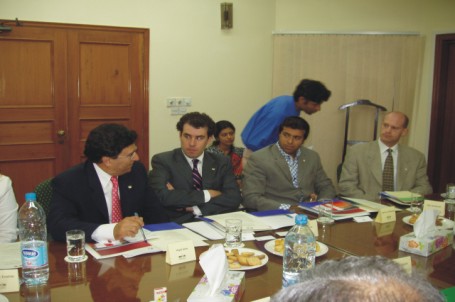
(From left to right) Mr. Wajid Khan, Mr. Alex Swann, Mr. Talib Noormohamed, Mr. Mikael MacDonald |
|
| |
|
|
| |
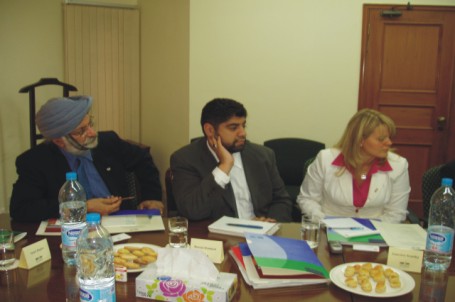
(From left to right) Mr. Mohinder Grewal, Mr. Hussein Hamdani, Ms. Genevieve Tremblay |
|
| |
|
|
| |
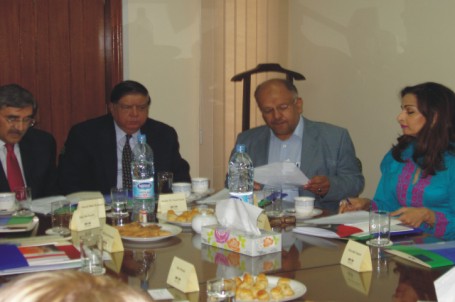
(From Left to Right) Mr. Ahmed Bilal Mehboob, Sardar M. Yusuf Khan, Mr. Farhan Bokhari, Ms. Sherry Rehman |
|
| |
|
|
| |
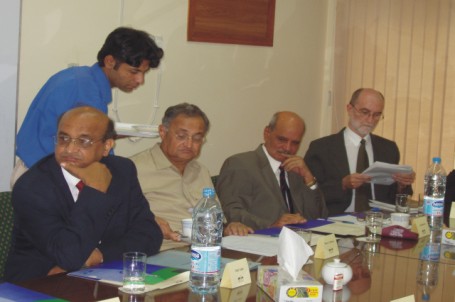
(From left to right) Porf. Dr. Tahir Amin, Senator Nisar A. Memon, Lt. Gen. (Rtd.) Asad Durrani, Mr. John Moore |
|
| |
|
|
| |
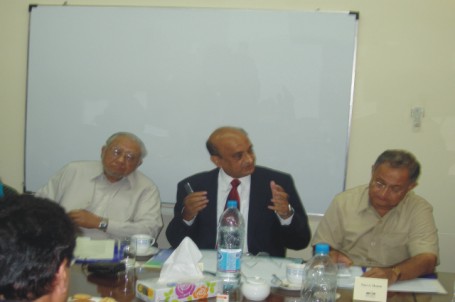
(From left to right) Prof. Khurshid Ahmed, Prof. Dr. Tahir Amin, Senator Nisar A. Memon |
|
| |
|
|
| |
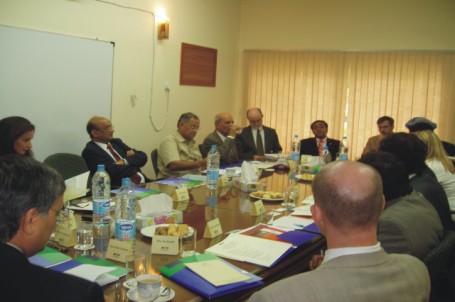
Participants at the Dialogue |
|
|
|
|
|
|
|
|